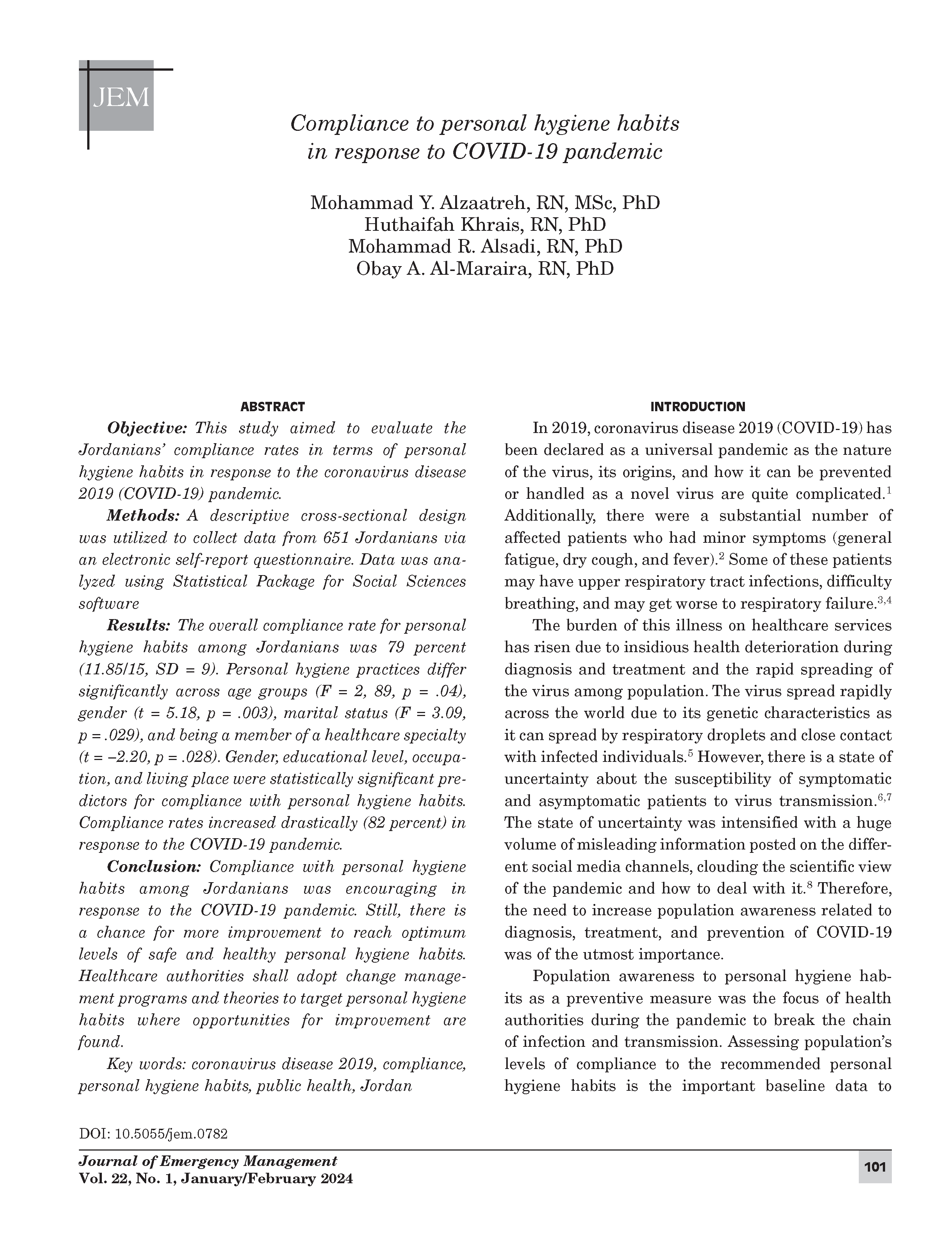Compliance to personal hygiene habits in response to COVID-19 pandemic
DOI:
https://doi.org/10.5055/jem.0782Keywords:
coronavirus disease 2019, compliance, personal hygiene habits, public health, JordanAbstract
Objective: This study aimed to evaluate the Jordanians’ compliance rates in terms of personal hygiene habits in response to the coronavirus disease 2019 (COVID-19) pandemic.
Methods: A descriptive cross-sectional design was utilized to collect data from 651 Jordanians via an electronic self-report questionnaire. Data was analyzed using Statistical Package for Social Sciences software
Results: The overall compliance rate for personal hygiene habits among Jordanians was 79 percent (11.85/15, SD = 9). Personal hygiene practices differ significantly across age groups (F = 2, 89, p = .04), gender (t = 5.18, p = .003), marital status (F = 3.09, p = .029), and being a member of a healthcare specialty (t = −2.20, p = .028). Gender, educational level, occupation, and living place were statistically significant predictors for compliance with personal hygiene habits. Compliance rates increased drastically (82 percent) in response to the COVID-19 pandemic.
Conclusion: Compliance with personal hygiene habits among Jordanians was encouraging in response to the COVID-19 pandemic. Still, there is a chance for more improvement to reach optimum levels of safe and healthy personal hygiene habits. Healthcare authorities shall adopt change management programs and theories to target personal hygiene habits where opportunities for improvement are found.
References
Azlan AA, Hamzah MR, Sern TJ, et al.: Public knowledge, attitudes and practices towards COVID-19: A cross-sectional study in Malaysia. PLoS One. 2020; 15(5): e0233668.
Zeenny RM, Ramia E, Akiki Y, et al.: Assessing knowledge, attitude, practice, and preparedness of hospital pharmacists in Lebanon towards COVID-19 pandemic: A cross-sectional study. J Pharm Policy Pract. 2020; 13(1): 1-12.
Tandon T, Dubey AK, Dubey S, et al.: Knowledge, attitude, and perception of Indian population toward coronavirus disease (COVID-19). J Family Med Prim Care. 2020; 9(8): 4265.
Shekarappa HT, Guttal KS, Iyer V, et al.: Knowledge, attitude and preventive practices related to novel coronavirus infection (COVID-19) among patients attending dental hospital in Dharwad. Asian J Med Sci. 2020; 11(5): 1-7.
Salman M, Mustafa Z, Asif N, et al.: Knowledge, attitude and preventive practices related to COVID-19 among health professionals of Punjab province of Pakistan. J Infect Dev Ctries. 2020; 14(7): 707-712.
Mousa KNAA, Saad MMY, Abdelghafor MTB: Knowledge, attitudes, and practices surrounding COVID-19 among Sudan citizens during the pandemic: An online cross-sectional study. Sudan J Med Sci. 2020; 15: 32-45.
Peng Y, Pei C, Zheng Y, et al.: A cross-sectional survey of knowledge, attitude and practice associated with COVID-19 among undergraduate students in China. BMC Public Health. 2020; 20(1): 1-8.
Alzoubi H, Alnawaiseh N, Al-Mnayyis A, et al.: COVID-19- knowledge, attitude and practice among medical and non-medical university students in Jordan. J Pure Appl Microbiol. 2020; 14: 17-24.
Al-Hanawi MK, Angawi K, Alshareef N, et al.: Knowledge, attitude and practice toward COVID-19 among the public in the Kingdom of Saudi Arabia: A cross-sectional study. Front Public Health. 2020; 8: 217.
Almofada SK, Alherbisch RJ, Almuhraj NA, et al.: Knowledge, attitudes, and practices toward COVID-19 in a Saudi Arabian population: A cross-sectional study. Cureus. 2020; 12(6): e8905.
Zhong B-L, Luo W, Li H-M, et al.: Knowledge, attitudes, and practices towards COVID-19 among Chinese residents during the rapid rise period of the COVID-19 outbreak: A quick online cross-sectional survey. Int J Biol Sci. 2020; 16(10): 1745-1752.
Lake MA: What we know so far: COVID-19 current clinical knowledge and research. Clin Med. 2020; 20(2): 124-127.
Roy D, Tripathy S, Kar SK, et al.: Study of knowledge, attitude, anxiety & perceived mental healthcare need in Indian population during COVID-19 pandemic. Asian J Psychiatr. 2020; 51: 102083.
Alzaatreh MY, Al-Maraira OA, Khrais H, et al.: The perceived threat of COVID-19 and its impact on hygienic precautionary behaviors: A multi-countries study. Public Health Nurs. 2022; 39(5): 899-908.
Amdur RJ, Bankert EA: Institutional Review Board: Member Handbook. Burlington, MA: Jones & Bartlett Publishers, 2010.
Bhagavathula AS, Aldhaleei WA, Rahmani J, et al.: Knowledge and perceptions of COVID-19 among health care workers: Cross-sectional study. JMIR Public Health Surveill. 2020; 6(2): e19160.
Atchison CJ, Bowman L, Vrinten C, et al.: Perceptions and behavioural responses of the general public during the COVID-19 pandemic: A cross-sectional survey of UK adults. medRxiv. 2020. DOI: 10.1101/2020.04.01.20050039.
Khan S, Gilani US, Raza SMM, et al.: Knowledge, awareness and practices of Pakistani professionals amid-COVID-19 outbreak. Sci Rep. 2021; 11: 17543.
Chavali S, Menon V, Shukla U: Hand hygiene compliance among healthcare workers in an accredited tertiary care hospital. Indian J Crit Care Med. 2014; 18(10): 689-693.
Fisher JD, Fisher WA: Theoretical approaches to individual-level change in HIV risk behavior. In Handbook of HIV Prevention. Berlin: Springer, 2000: 3-55.
Azjen I, Fishbein M: Understanding Attitudes and Predicting Social Behavior. Englewood Cliffs, NJ: Prentice-Hall, 1980.
Ajzen I: The theory of planned behavior. Organ Behav Hum Decis Process. 1991; 50(2): 179-211.
Gła˛bska D, Skolmowska D, Guzek D: Population-based study of the influence of the COVID-19 pandemic on hand hygiene behaviors—Polish adolescents’ COVID-19 experience (PLACE-19) study. Sustainability. 2020; 12(12): 4930.
Fung IC-H, Cairncross S: How often do you wash your hands? A review of studies of hand-washing practices in the community during and after the SARS outbreak in 2003. Int J Environ Health Res. 2007; 17(3): 161-183.
Csenge F-N, Kincso˝ F-NC, Dezso˝ M, et al.: Comparative study of hygiene habits in three different groups in Hungary. New Med. 2016; 20(4): 141-147.
Azor-Martínez E, Cobos-Carrascosa E, Gimenez-Sanchez F, et al.: Effectiveness of a multifactorial handwashing program to reduce school absenteeism due to acute gastroenteritis. Pediatr Infect Dis J. 2014; 33(2): e34-e39.

Published
How to Cite
Issue
Section
License
Copyright 2007-2025, Weston Medical Publishing, LLC and Journal of Emergency Management. All Rights Reserved.





